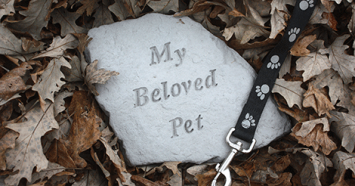
The choices can be overwhelming and difficult for a bereaved pet parent, but options are inexhaustible when considering what to do with the remains once your pet has passed on. The decision is deeply personal, and for some pet parents it can even vary from pet to pet. Whether you’re facing this decision now, or foresee it in the future, it doesn’t hurt to think about some of the pros and cons.
Cremation
When a pet is cremated, their body is placed into an extremely hot fire and the remains are rendered into ashes. There is no fur or other tissue left, but ashes consist of pulverized bone fragments, usually looking like grayish sand. If you opt for a communal cremation, your pet may be cremated along with the bodies of other pets from other clinics or shelters, and the remains will not be returned to you. However, you can opt for private cremation and have the ashes returned to you. The cost for private cremation is usually 3-4 times higher and pricing varies based on the size of your pet.
Most crematoriums place the ashes into a sealed bag which is placed inside a modest canister or box. What you choose to do with the ashes is up to you. You may decide to bury them on your property or have them interred in a pet cemetery. You may also opt to keep them in your home in a decorative urn, have a piece of memorial jewelry designed with them inside, or keep them in a way that feels significant to you.
Many pet parents report a sense of comfort or calm once their pet’s ashes are returned to them, but there are other benefits to cremation:
More earth friendly as little to no ground space is utilized as it would be for a burial
Typically less expensive than professional burial
More options for how you can memorialize your cat or dog (using urns, plaques, photos, or other memorabilia with the ashes)
Burial
If you don’t feel that cremation is the right choice, you might want to consider burial. Firstly, be aware than burying your pet on your own property may be illegal in some areas. Check your local laws first. Secondly, the act of home burial can be a physically and logistically difficult task in some cases, especially for those with large dogs.
Remember that professional pet burial services are available, though there are more costs associated with this option. If you’re not familiar with any pet cemeteries nearby, ask your vet’s office or local funeral services director for referrals. Options may vary by company, but many offer headstones, caskets, and caretaking. You also have the option to bury a pet’s ashes instead of the complete body.
Some pet parents feel more comfortable going through a burial service, finding comfort in managing things as they would a human loved one. There are some additional benefits to burial:
Not managing the burial yourself allows others to handle what might be a painful task. Professional burial at a pet cemetery is a good thing to consider if there’s a chance that you’ll be moving and want to continue visiting a gravesite.
If a pet is buried, you won’t need to make arrangements or accommodations for what to do with their remains once you pass on. It may not seem like much in the case of a single pet, but can be daunting for the family of someone with many pets.
If you need some time to consider these options, talk to your vet about storing your pet’s remains before they need to be sent for cremation, burial, or returned to you. You may have time to consider the options while you’re processing the loss. Whether you decide to cremate or bury your pet, taking the time to process the feelings and allowing yourself the means to say goodbye and memorialize your pet can aid in your healing process.